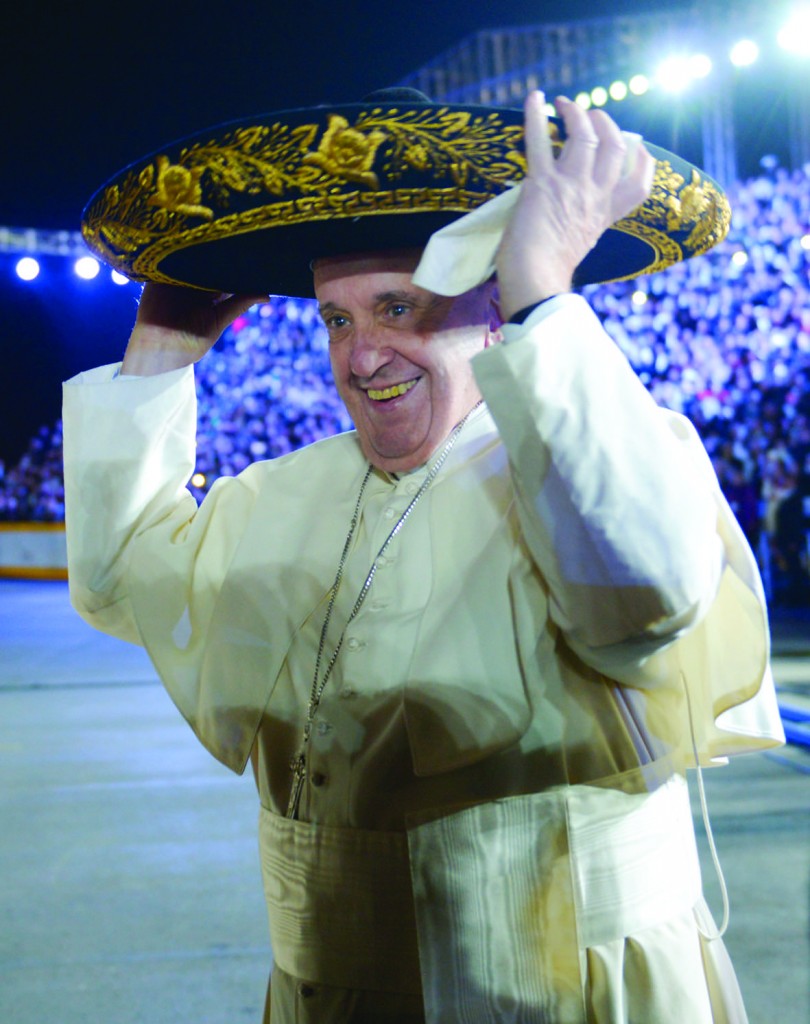
Pope Francis wears a sombrero during his arrival to Mexico City on February 12
The mid-February trip to Mexico was a tour de force, with millions of Mexicans turning out to greet the Pope. There was a moment of anger, a moment at “the fence” and… a controversial interview
The Pope is human. Pope Francis demonstrated that in Mexico, as he does wherever he goes, and most people find it attractive most of the time.
In Pope Francis, Catholics can see a real person trying to live his faith in a complicated world. Sometimes he waves at them and they can see the frayed edges of his soutane sleeve. When his sciatica is acting up, he needs extra help going down steps. His aides do not keep his reading glasses, so sometimes he fumbles with the soutane pocket trying to get them out.
Crowds “ahhh” when he tenderly strokes the face of an obviously sick person, and they applaud when he gives a big hug to a child. However, they can be shocked when the human side of the Pope is impatience or downright anger like it was February 16 in Morelia, Mexico, when one of the thousands of people who grab the Pope at public events yanked him, pulling him on top of a person seated in a wheelchair.
“What’s the matter with you?” the Pope snapped. “Don’t be selfish!”
While security officers helped the Pope back up, Pope Francis caressed the face of the boy he’d fallen on.
The off-the-cuff Pope Francis is very human, too. That touches people who experience a Pope really listening to them and who is taking notes as people ask him questions.
But those spontaneous remarks can be frustratingly incomplete or imprecise.
Flying back from Mexico February 17, Pope Francis was asked to react to Donald Trump’s accusations that the Pope is political and, since the Pope had just celebrated Mass at the Mexican-U.S. border, he also was asked to comment on Trump’s proposal to build a wall along the entire length of the border and deport millions of immigrants. Pope Francis answered, “If he says these things, this is not Christian.”
The Pope was less clear in responding to a question about whether “avoiding pregnancy” could be considered a “lesser evil” when facing the possibility of birth defects from the Zika virus. The Pope used the word “contraception” when referring (note: evidently misremembering, since there is no record of this permission) to Blessed Paul VI allowing women religious in the Belgian Congo in the 1960s to take the pill to avoid becoming pregnant if they were the victims of rape, which was being used as a weapon of war.
Pope Francis’ answer to another question, one that did not make the news, also illustrates his human side. He was asked what he was praying for during the 20 minutes he sat before the image of Our Lady of Guadalupe in Mexico City. He said he prayed for so many things that Mary, “poor thing,” probably had a headache when he was done. He said he prayed for forgiveness, for the growth of the Church, for the Mexican people, for priests, nuns, bishops. “I asked for a lot.”
But he would not say more or give more details. “The things a child tells his mother are kind of secret,” he explained.
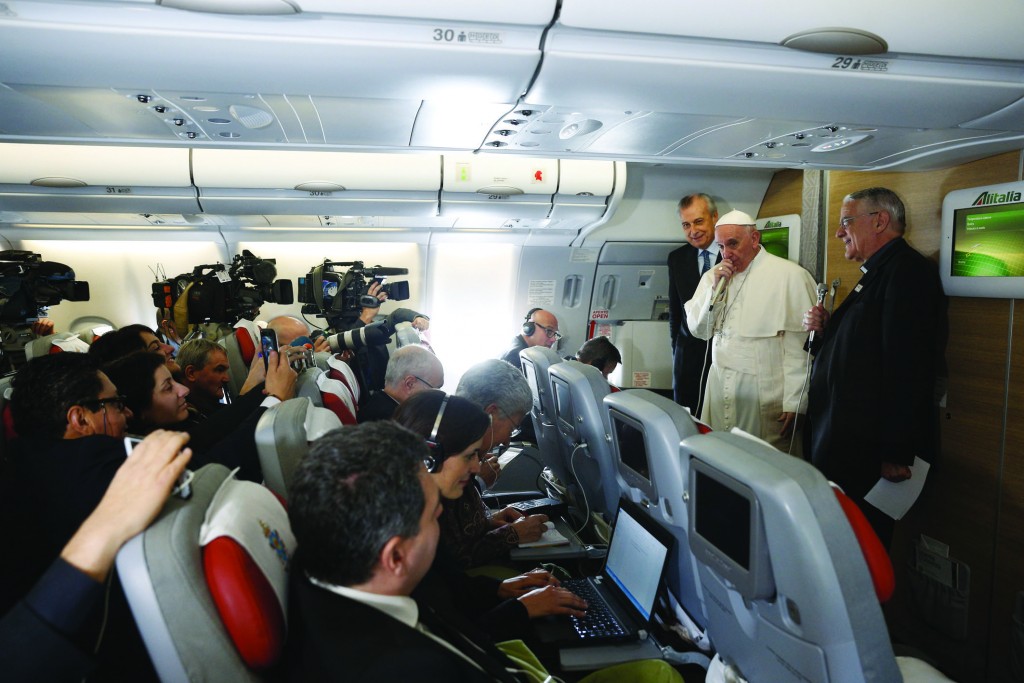
Pope Francis greets journalists aboard his flight to Havana on February 12. He was traveling to Mexico for a six-day visit, but stopped briefly in Cuba to meet with Russian Orthodox Patriarch Kirill of Moscow at the Havana airport
Clearing up the confusion about contraception, Zika virus
In the in-flight press conference on his way home from Mexico, Pope Francis was asked whether contraception could be used by women infected with the Zika virus.
In his off-the-cuff answer, Francis said that “avoiding pregnancy is not an absolute evil” and added that one of his predecessors, Paul VI, had approved the use of contraception for nuns threatened with rape in the Congo in the 1960s. Secular news outlets all jumped on the same bandwagon, declaring that the Pope’s words “opened the door” to approving artificial contraception for married couples in special cases.
But Catholic author and professor Janet E. Smith explained why Francis’ remarks could be interpreted to mean this: To suggest that some “emergency” or “special situation” would permit a person in conscience to use contraception does not align with Catholic moral theology. For spouses to use contraception is always wrong… One job of the conscience is precisely to enable a person to honor moral norms in special situations. In emergencies or special situations we are not permitted, for instance, directly to kill innocent human beings even if great good could come from that death…
As for the reference to Paul VI and the nuns in the Congo, Professor Smith notes: “For a woman to do something to prevent a rapist’s sperm from uniting with her ovum is a part of justifiable self-defense. Her act has nothing to do with violating God’s plan for sexuality. She is not choosing to use contraception to prevent a spousal act of sexual intercourse from achieving its natural end. She is not refusing to make a complete gift of herself to her spouse.”
The Interview that Provoked an Uproar
On February 18, aboard his plane, Shepherd One, back to Rome, Pope Francis concluded a triumphant visit to Mexico, a country at once a land of steadfast faith — the land of the Lady of Guadalupe — and one historically cool, officially, toward the Vatican and the institutional Church. During the flight, Francis granted a lengthy press conference, sharing thoughts on many subjects including pedophile priests, Mexico’s “desaparecidos,” the Church in Ukraine, US politician Donald Trump, and the Zika virus. The press conference was moderated by Fr. Federico Lombardi, SJ, director of the Holy See Press Office. Here is the complete text:
Fr. Lombardi: Holy Father, thank you for being here, as at the end of every trip, for the summary conversation, a broad look at the trip that has occurred, and for your availability to respond to so many questions from our international community.
We have, as usual, asked the different language groups to organize and prepare a few questions, but naturally we begin with our colleagues from Mexico.
Maria Eugenia Jimenez Caliz, Milenio (Mexico): Holy Father, in Mexico there are thousands of “desaparecidos,” (disappeared) but the case of 43 (students) of Ayotzinapa is an emblematic case.
I would like to ask you, why didn’t you meet with their families? Also, (please send) a message for the families of thousands of the “desaparecidos.”
Pope Francis: If you read the messages attentively, I made reference continuously to the killings, the death, the life taken by all of these narcotrafficking gangs and human smugglers. I spoke of this problem as one of the wounds that Mexico suffers. There was an attempt to receive one of these groups, and there were many groups, even opposed among themselves, with infighting, so I preferred to say that I would see all of them at the Mass in Juarez or at another (Mass). It was practically impossible to meet all of these groups, which on the other hand were also fighting among themselves. It’s a situation that’s difficult to understand, especially for me because I’m a foreigner, right? I think that even Mexican society is a victim of all of this, of these crimes of “cleaning” people, of discarding people. I spoke about it in four speeches even, and you can check for it there. It’s a great pain that I’m taking, because this nation doesn’t deserve a drama like this one.
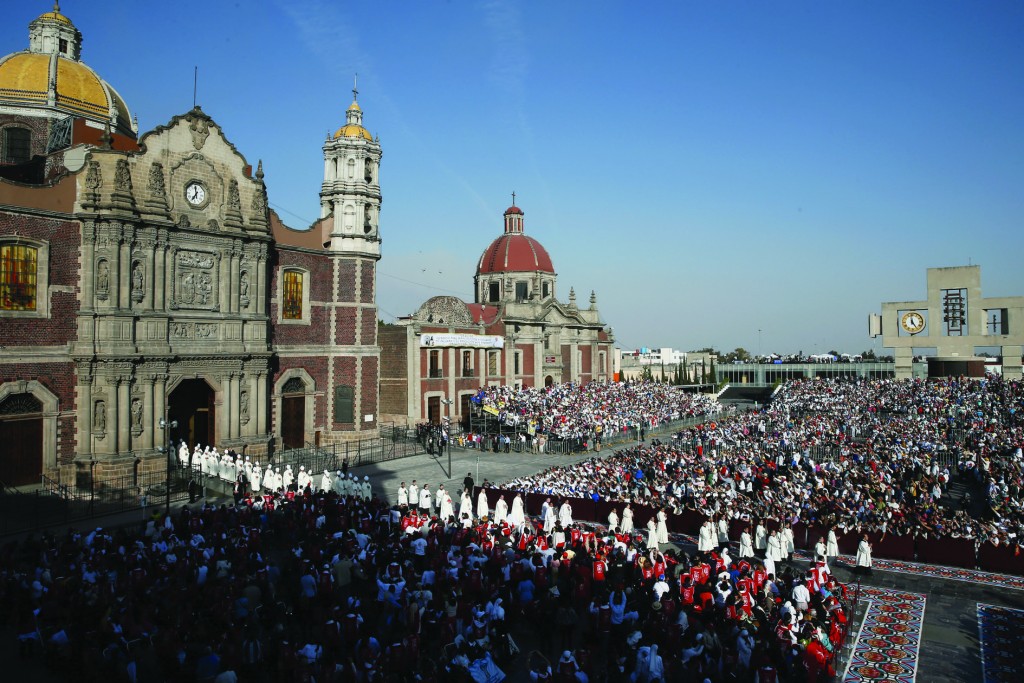
Bishops process from the historic Basilica of Our Lady of Guadalupe to the modern basilica for a Mass celebrated by Pope Francis in Mexico City Feb. 13.
Javier Solorzano, Channel 11 (Mexico): The subject of pedophilia, as you know, in Mexico has very dangerous roots, very hurtful. The case of Father Maciel left a strong mark, especially on the victims. The victims continue to feel unprotected by the Church. Many continue to be men of faith. Some are still even in the priesthood.
I want to ask you, what do you think of this subject? Did you at any moment consider meeting with the victims? And, in general, this idea that when the priests are detected in cases of this nature, what is done is that they are moved to another parish, nothing more? Thanks.
Pope Francis: OK, I’m going to start with the second. First, a bishop who moves a priest to another parish when a case of pedophilia is discovered is a reckless (inconsciente) man and the best thing he can do is to present his resignation. Is that clear?
Secondly, going back, the Maciel case, and here, I allow myself to honor the man who fought in moments when he had no strength to impose himself, until he managed to impose himself. Ratzinger. Cardinal Ratzinger deserves applause. (applause) Yes, applause for him. He had all of the documentation. He’s a man who as the prefect of the Congregation for the Doctrine of the Faith had everything in his hands. He conducted all the investigations, and went on, went on, went on, until he couldn’t go any further in the execution. But, if you remember, 10 days before the death of St. John Paul II, in that Via Crucis of Holy Friday, he said to the whole Church that it needed to clean up the dirt of the Church. And in the Pro Eligendo Pontefice Mass, despite knowing that he was a candidate, he wasn’t stupid, he didn’t care to “make-up” his answer, he said exactly the same thing. He was the brave one who helped so many open this door. So, I want to remember him because sometimes we forget about these hidden works that were the foundations for “taking the lid off the pot.”
Thirdly, we’re doing quite a lot with the Cardinal Secretary of State (Pietro Parolin), and with the group of nine cardinal advisors.
After listening, I decided to name a third secretary adjunct for the Congregation for the Doctrine of the Faith to take charge solely of these cases, because the Congregation isn’t able to keep up with all the cases it has.
Also, an appeals tribunal was constituted by Monsignor (Charles) Scicluna which is dealing with the cases of second instance when there are recourses, because the first recourses are done by the plenary of the (Congregation of the) Doctrine of the Faith, the “feria quarta,” they call it, that gathers on Wednesdays. When there is recourse, it goes back to first instance, and it’s not fair.
So, the second instance is also a legal matter, with a defending lawyer, but we need to work faster, because we’re behind with the cases, because cases continue to appear.
Another thing that is working very well is the commission for the protection of minors. It’s not exclusively devoted to cases of pedophilia, but the protection of minors. There, I spent an entire morning with six of them, two German, two British and two Irish. Abused men and women. Victims.
And I also met with victims in Philadelphia. So we’re working. But I thank God because the lid is off the pot, and we have to continue taking it off. We need to take consciousness.
And, the final thing I would like to say [is] that it’s a monstrosity, because a priest is consecrated to lead a child to God, and he eats him in a diabolical sacrifice. He destroys him.
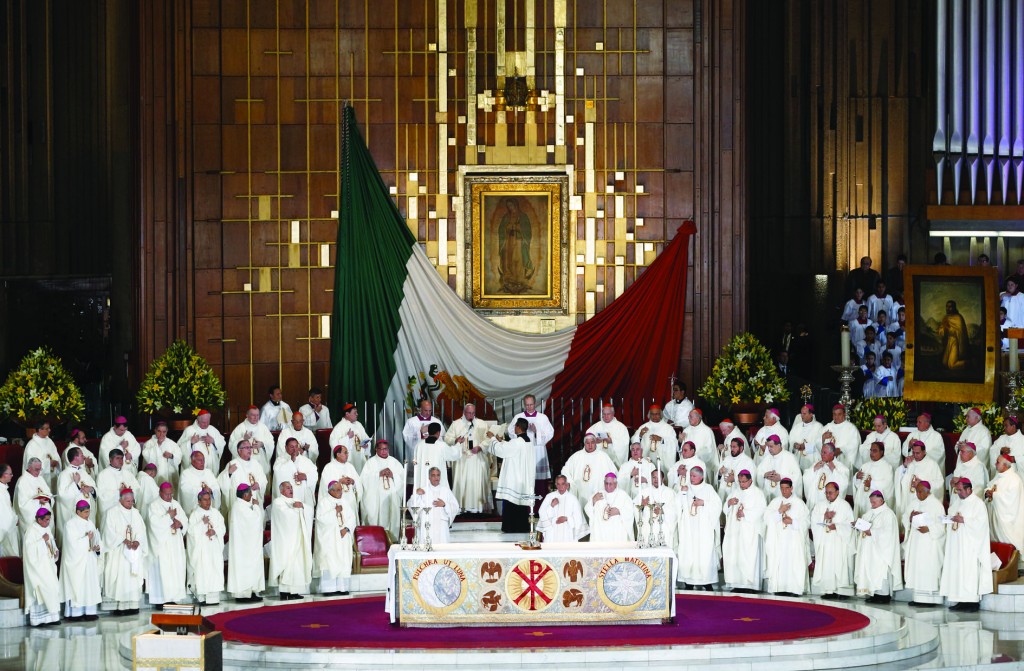
The original image of Our Lady of Guadalupe is seen as Pope Francis celebrates Mass in the Basilica of Our Lady of Guadalupe in Mexico City Feb. 13.
Javier Solorzano: And on Maciel?
Pope Francis: Well, about Maciel, going back to the congregation (editor’s note: The Legion of Christ, order founded by then-Fr. Marcial Maciel), there was an intervention and today the government of the congregation is semi-involved. That is, the superior general, who is elected by a council, by the general chapter, and the other two are selected by the Pope. In this way, we are helping to review old accounts.
Phil Pullella, Reuters: Today, you spoke very eloquently about the problems of immigration. On the other side of the border, there is a very tough electoral battle.
One of the candidates for the White House, Republican Donald Trump, in an interview recently said that you are a political man and he even said that you are a pawn, an instrument of the Mexican government for migration politics.
Trump said that if he’s elected, he wants to build 2,500 kilometers of wall along the border. He wants to deport 11 million illegal immigrants, separating families, etcetera.
I would like to ask you, what do you think of these accusations against you and if a North American Catholic can vote for a person like this?
Pope Francis: Thank God he said I was a politician because Aristotle defined the human person as “animal politicus.” At least I am a human person. As to whether I am a pawn, well, maybe, I don’t know. I’ll leave that up to your judgment and that of the people. And then, a person who thinks only about building walls, wherever they may be, and not building bridges, is not Christian. This is not in the Gospel. As far as what you said about whether I would advise to vote or not to vote, I am not going to get involved in that. I say only that this man is not Christian if he has said things like that. We must see if he said things in that way and in this I give the benefit of the doubt.
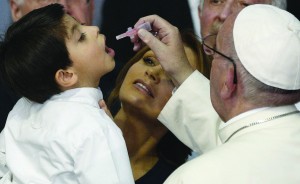
Pope Francis gives a vaccine to Rodrigo Lopez Miranda, 5, held by Mexico’s first lady Angelica Rivera during a visit to the Federico Gomez Children’s Hospital of Mexico in Mexico City Feb. 14.
Jean-Louis de la Vaisserie, AFP (France): The meeting with the Russian Orthodox Patriarch Kirill and the signing of the joint declaration was greeted by the entire world as an historic step. But now today in the Ukraine, Greek Catholics feel betrayed. They speak of a political document that supports Russian politics. In the field, the war of words has reignited. Do you think you’ll be able to go to Moscow? Were you invited by the patriarch? Or, (will you) go to Crete to greet the Pan-Orthodox Council in the spring?
Pope Francis: I’ll begin with the end. I will be present…spiritually. And with a message. I would like to go greet them there at the Pan-Orthodox Synod. They are brothers, but I must respect them. But, I know that they want to invite Catholic observers and this is a good bridge, but behind the Catholic observers I will be praying with my best wishes that the Orthodox move ahead because they are brothers and their bishops are bishops like us.
Then, Kirill, my brother. We kissed each other, embraced, and then a conversation for an hour (Fr. Lombardi corrects)…two hours. Old age doesn’t come on its own. (laughs) Two hours where we spoke as brothers, sincerely and no one knows what was spoken about, only what we said at the end publicly about how we felt as we spoke.
Secondly, that statement, that declaration about Ukraine. When I read this, I was a little bit worried because it was Sviatoslav Schevchuk who said that the Ukrainian people, some Ukrainians, also many Ukrainians, felt disappointed and betrayed. I know Sviatoslav very well. In Buenos Aires, we worked together for four years. When he was elected – at 42 years old, eh, good man – he was elected major archbishop, he came back to Buenos Aires to get his things. He came to me and he gave me an icon — little like this — of Our Lady of Tenderness. And he told me, ‘This has accompanied me my entire life. I want to leave it to you who accompanied me over the last four years. It’s one of the few things I had brought from Buenos Aires and I keep it on my desk. That is, he’s a man whom I respect and also familiarity. We use “tu” with each other (editor’s note: “tu” is the informal way of addressing someone in Italian – they speak as friends) and so on.
So, for this it seemed strange to me and I remembered something I said here to you: to understand a piece of news, a statement, you need to seek the hermeneutic of everything.
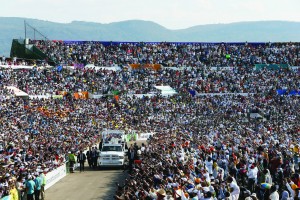
Pope Francis arrives for a meeting with families at the Victor Manuel Reyna Stadium in Tuxtla Gutierrez, Mexico, Feb. 15.
But, when you said this, it was said in a statement from January 14th, last February, last Sunday…an interview made by brother… I don’t remember… a priest, a Ukrainian priest, in Ukraine it was conducted and it was published. That news, the interview is one page, two, a little bit more, give or take. That interview is on the last page, a little like this. I read the interview and I’ll say this: Schevchuk, in the dogmatic part, declares himself to be a son of the Church and in communion with the bishop of Rome and the Church. He speaks of the Pope and his closeness of the Pope and of himself, his faith, and also of the Orthodox people there. The dogmatic part, there’s no difficulty. He’s Orthodox in the good sense of the word, that is, in Catholic doctrine, no.
And then, as in an interview like this one, everyone has the right to say his things and this wasn’t done in the meeting, because the meeting, it was a good thing and we have to move forward.
This, he didn’t do in the meeting, the encounter was a good thing and we must move forward. This, the second chapter, the personal ideas that a person has.
For example, this, what I said about the bishops who move pedophile priests, the best thing they can do is resign.
This isn’t a dogmatic thing, but this is what I think. So, he has his personal ideas. They’re for dialoguing and he has a right to have them.
Thirdly… ah, all of what he’s speaking about is in the document, that’s the issue. On the fact of the meeting: the Lord chose to move it ahead, the embrace and all is well. The document. It’s a debatable document and there’s also another addition. In Ukraine, it’s a moment of war, of suffering, with so many interpretations. I have named the Ukrainian people, asking for prayers, closeness, so many times both in the Angelus and in the Wednesday audience. There is this closeness. But the historical fact of a war, experienced as…I don’t know if…well, everyone has their own idea of this war, who started it, what to do and it’s evident that this is a historical issue, but also a personal, historical, existential issue of that country and it speaks of the suffering. And, there I insert this paragraph. You can understand the faithful, because Stanislav told me that so many faithful have written to me saying that they are deeply disappointed and betrayed by Rome. You can understand that a people in this situation would feel this, no? The final document but it is a jotting down of some things. Pardon, it’s debatable on this question of Ukraine. But there, it says to make the war stop, that they find agreements. Also, I personally said that the Minsk accords move forward and are not eliminated. “With the elbows what wasn’t written with the hands.” (Original phrase in Italian: “Con il gomito quello che non e scritto con le mani”)
The Church of Rome, the Pope has always said, “Seek peace.” I also received both presidents. Equality, no? And so for this when he says that he’s heard this from his people, I understand it. I understand it. But, that’s not the news. The news is everything.
If you read the entire interview, you’ll see that there are serious dogmatic things that remain, there’s a desire for unity, to move ahead in the ecumenical — and he’s an ecumenical man. There are a few opinions. He wrote to me when he found out about the trip, the encounter, but, as a brother, giving his opinion as a brother. I don’t mind the document how it is. I don’t dislike it in the sense that we need to respect the things that everyone has the freedom to think and in (the context of) this situation that is so difficult. From Rome, now the nuncio is on the border where they’re fighting, helping soldiers and the wounded. The Church of Rome has sent so much help there. It’s always peace, agreements. We must respect the Minsk accords and so on. This is the entirety. But, don’t get scared by that phrase. And this is a lesson that a piece of news must be interpreted with the hermeneutic of everything and not just a part.
de la Vaisserie: Did the Patriarch invite you to come to Moscow sometime?
Pope Francis: Patriarch Kirill. I would prefer — because if I say one thing, I have to say another and another and another. I would prefer that what we spoke about, us, alone, will remain only what we said in public. This is a fact. And if I say this, then I’ll have to say another and another… no! The things I said in public, the things he said in public. This is what can be said about the private conversation. To say it, it wouldn’t be private. But, I tell you, I walked out of it happy, and he did too.
Carlo Marroni, Il Sole 24 (Italy): Holy Father, my question is about the family, a subject which you addressed often during this trip. The Italian parliament is discussing a law on civil unions, a subject that is provoking strong political clashes but also a strong debate in society and among Catholics. In particular, I would like to know your thoughts on the subject of adoption by civil unions and therefore on the rights of children and of sons and daughters in general.
Pope Francis: First of all, I don’t know how things stand in the thinking of the Italian parliament. The Pope doesn’t get mixed up in Italian politics. At the first meeting I had with the (Italian) bishops in May 2013, one of the three things I said was: with the Italian government you’re on your own. Because the Pope is for everybody and he can’t insert himself in the specific internal politics of a country. This is not the role of the Pope, right? And what I think is what the Church thinks and has said so often — because this is not the first country to have this experience, there are so many — I think what the Church has always said about this.
Paloma García Ovejero, Cadena COPE (Spain): Holy Father, for several weeks there’s been a lot of concern in many Latin American countries but also in Europe regarding the Zika virus. The greatest risk would be for pregnant women. There is anguish. Some authorities have proposed abortion, or else to avoid pregnancy. As regards avoiding pregnancy, on this issue, can the Church take into consideration the concept of “the lesser of two evils”?
Pope Francis: Abortion is not the lesser of two evils. It is a crime. It is to throw someone out in order to save another. That’s what the Mafia does. It is a crime, an absolute evil. On the “lesser evil,” avoiding pregnancy, we are speaking in terms of the conflict between the fifth and sixth commandments. Paul VI, a great man, in a difficult situation in Africa, permitted nuns to use contraceptives in cases of rape.
Don’t confuse the evil of avoiding pregnancy by itself, with abortion. Abortion is not a theological problem, it is a human problem, it is a medical problem. You kill one person to save another, in the best case scenario. Or to live comfortably, no? It’s against the Hippocratic oaths doctors must take. It is an evil in and of itself, but it is not a religious evil in the beginning, no, it’s a human evil. Then obviously, as with every human evil, each killing is condemned.
On the other hand, avoiding pregnancy is not an absolute evil. In certain cases, as in this one, or in the one I mentioned of Blessed Paul VI, it was clear. I would also urge doctors to do their utmost to find vaccines against these two mosquitoes that carry this disease. This needs to be worked on.
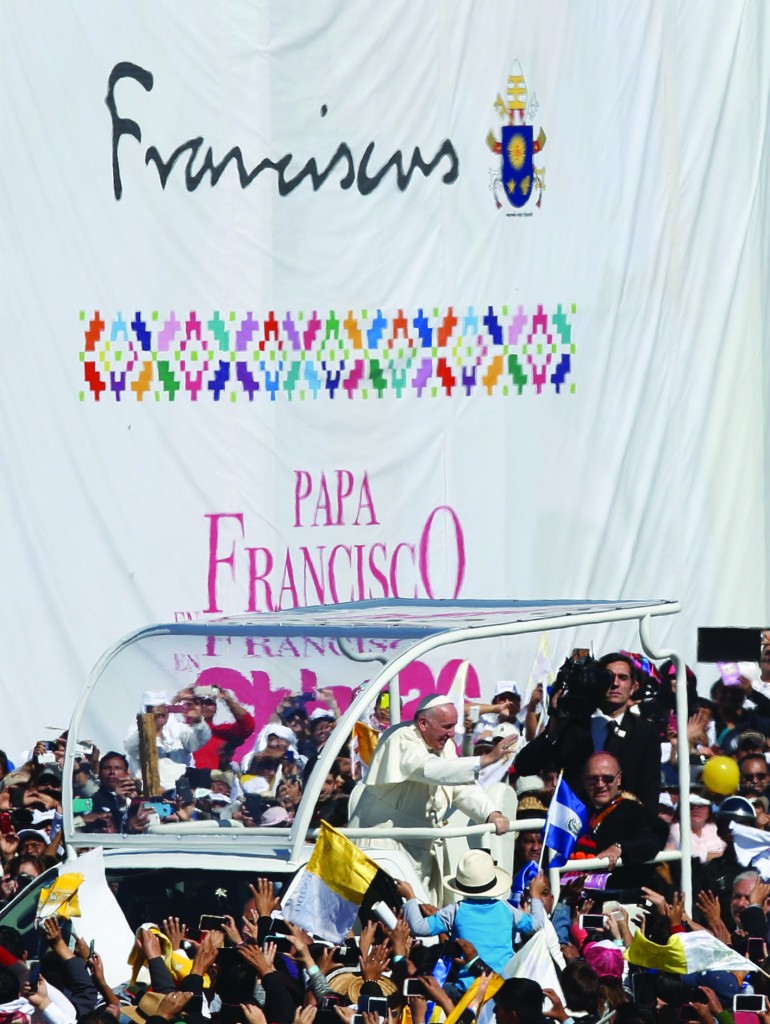
Pope Francis greets the crowd as he arrives to celebrate Mass with the indigenous community from Chiapas in San Cristobal de Las Casas, Mexico, Feb. 15
Jurgen Erbacher, ZDF (Germany): Holiness, you will soon receive the Charlemagne Prize, and that’s the main European one. What do you say to Europe, which now seems to be falling to pieces, first with the crisis of the euro and now that of the refugees? Maybe you have a word for us in this situation of European crisis?
Pope Francis: First, about the Charlemagne Prize. I had the habit of not accepting prizes or honors, but always, not out of humility, but because I don’t like them. Maybe it’s a little crazy, but it’s good to have it, but I just don’t like them. But in this case, I don’t say (I was) forced, but convinced by the holy and theological headstrongness of Cardinal Kasper, because he was chosen, elected by Aachen to convince me. And I said yes, but in the Vatican. And I said I offer it for Europe, as a co-decoration for Europe, a prize so that Europe may do what I desired at Strasburg; that it may no longer be “grandmother Europe” but “mother Europe.”
Secondly, reading the news the other day about this crisis and so on — I read little, I just glance through one newspaper — I won’t say the name so as not to create jealousy, but it is known! — Just 15 minutes, then I get information from the Secretariat of State and so on. And, there was one word that I liked, and I don’t know if they will approve it or not, but it was “the re-foundation of the European Union.” I thought of the great fathers, but today where is there a Schuman, an Adenauer, these great ones who after the war founded the European Union? I like this idea of the re-foundation of the European Union, maybe it can be done, because Europe — I do not say is unique, but it has a force, a culture, a history that cannot be wasted, and we must do everything so that the European Union has the strength and also the inspiration to make it go forward. That’s what I think.
Anne Thompson, NBC (USA): Some wonder how a Church that claims to be merciful, how can the Church forgive a murderer easier than someone who has divorced and remarried?
Pope Francis: I like this question! On the family, two synods have spoken. The Pope has spoken on this all year in the Wednesday Catechesis. The question is true, you posed it very well. In the post-synod document that will be published, perhaps before Easter — it picks up on everything the synod — in one of the chapters, because it has many — it spoke about the conflicts, wounded families and the pastoral (care) of wounded families. It is one of the concerns. As another is the preparation for marriage. Imagine, to become a priest there are eight years of study and preparation, and then if after a while you can’t do it, you can ask for a dispensation, you leave, and everything is OK. On the other hand, to make a sacrament (marriage), which is for your whole life, three to four conferences… Preparation for marriage is very important. It’s very, very important because I believe it is something that in the Church, in common pastoral ministry, at least in my country, in South America, the Church has not valued much.
For example, not so much anymore but some years ago in my homeland there was a habit, something called casamiento de apuro, a marriage in haste because the baby is coming and to cover socially the honor of the family. There, they weren’t free and it happened many times this marriage is null. As a bishop I forbade my priests to do this. Priests, when there was something like this, I would say, let the baby come, let them continue as fiancés, and when they feel like they can continue for the rest of their lives, then they could go ahead. There is a lack there.
Another very interesting chapter is the education of children: the victims of problems of the family are the children. The children. Even of problems that neither husband nor wife have a say in. For example, the needs of a job. When the dad doesn’t have free time to speak to his children, when the mother doesn’t have time to speak with her children. When I confess a couple who have kids, a married couple, I ask, “How many children do you have?’” Some get worried and think the priest will ask why I don’t have more. I would make a second question, “Do you play with your children?” The majority say, “But Father, I have no time. I work all day.” Children are victims of a social problem that wounds the family. It is a problem… I like your question.
Another interesting thing from the meeting with families in Tuxtla. There was a couple, married again in a second union, integrated in the pastoral ministry of the Church. The key phrase used by the synod, which I’ll take up again, is “integrate” in the life of the Church the wounded families, remarried families, etcetera. But of this one mustn’t forget the children in the middle. They are the first victims, both in the wounds, and in the conditions of poverty, of work, etcetera.

Girls dressed as monarch butterflies perform as Pope Francis meets with young people at the Jose Maria Morelos Pavon Stadium in Morelia, Mexico, Feb. 16. The area is host to monarch butterflies who migrate from Canada during the winter
Thompson: Does that mean they can receive Communion?
Pope Francis: This is the last thing. Integrating in the Church doesn’t mean receiving Communion. I know married Catholics in a second union who go to church, who go to church once or twice a year and say I want Communion, as if joining in Communion were an award. It’s a work towards integration, all doors are open, but we cannot say, “From here on they can have Communion.” This would be an injury also to marriage, to the couple, because it wouldn’t allow them to proceed on this path of integration. And those two were happy. They used a very beautiful expression: we don’t receive Eucharistic Communion, but we receive Communion when we visit hospitals and in this and this and this. Their integration is that. If there is something more, the Lord will tell them, but it’s a path, a road.
Antoine Marie Izoard, I.Media (France): Holiness, good evening. I permit myself first off, joking, to tell you how much we Vaticanistas are hostages of the schedule of the Holy Father and we can’t play with our children. Saturday is the jubilee audience, Sunday the Angelus and from Monday through Friday we have to go work. And also a hug to Alberto, who with Fr. Lombardi 20 years ago hired me at Vatican Radio. We’re in family here.
A question that is a bit “risqué,” Holiness. Numerous media have evoked and made a lot of noise on the intense correspondence John Paul II and the American philosopher, Ana Teresa Tymieniecka, who had a great affection, it’s said, for the Polish Pope. In your viewpoint, can a Pope have such an intimate relationship with a woman? And also, if you allow me, you who have an important correspondence, have you known this type of experience?
Pope Francis: I already knew about this friendship between St. John Paul II and this philosopher when I was in Buenos Aires. It was known. Also her books are known. John Paul II was a restless man. Then, I would also say that a man who does not know how to have a relationship of friendship with a woman — I’m not talking about misogynists, who are sick —well, he’s a man who is missing something.
And in my own experience, including when I ask for advice, I would ask a collaborator, a friend, I also like to hear the opinion of a woman because they have such wealth. They look at things in a different way. I like to say that women are those who form life in their wombs — and this is a comparison I make — they have this charism of giving you things you can build with. A friendship with a woman is not a sin. (It’s) a friendship. A romantic relationship with a woman who is not your wife, that is a sin. Understand?
But the Pope is a man. The Pope needs the input of women, too.
And the Pope, too, has a heart that can have a healthy, holy friendship with a woman. There are saint-friends — Francis and Clare, Teresa and John of the Cross — don’t be frightened.
But women are still not considered so well; we have not understood the good that a woman can do for the life of a priest and of the Church in the sense of counsel, help or a healthy friendship.
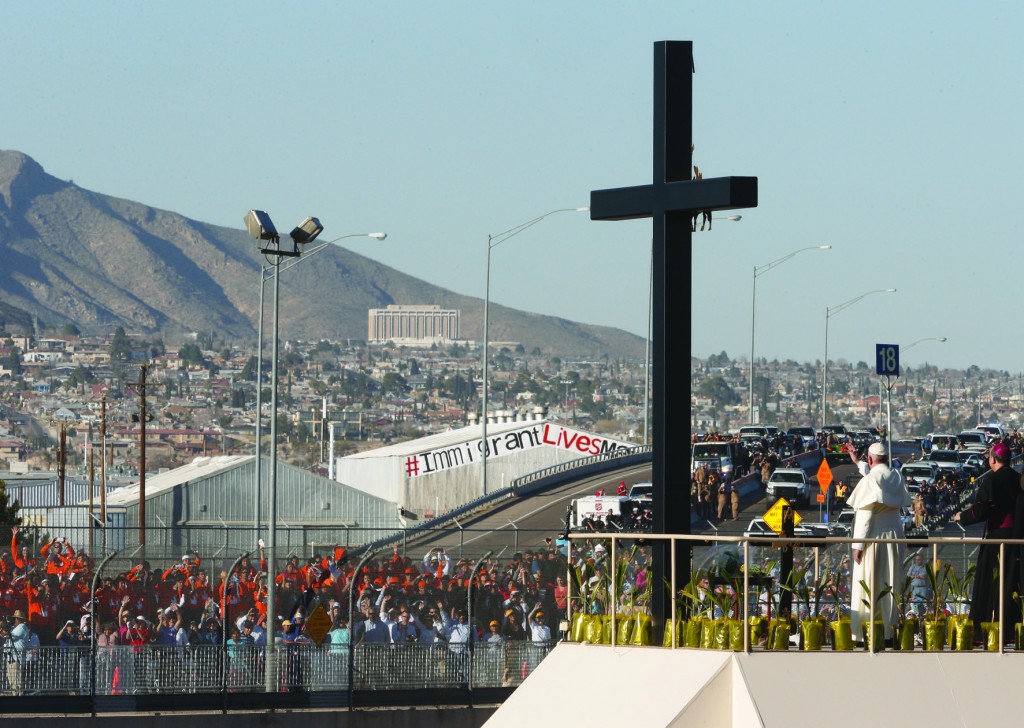
Pope Francis waves to people gathered in El Paso, Texas, after praying at a cross on the Mexican side of the border in Ciudad Juarez, Mexico, Feb. 17
Franca Giansoldati, Il Messaggero (Italy): Holiness, good evening. I return back to the topic of the law that is being voted on in the Italian parliament. It is a law that in some ways is about other countries, because other countries have laws about unions among people of the same sex. There is a document from the Congregation for the Doctrine of the Faith from 2003 that dedicates a lot of attention to this, and even more, dedicates a chapter to the position of Catholic parliamentarians in parliament before this question. It says expressly that Catholic parliamentarians must not vote for these laws. Considering that there is much confusion on this, I wanted to ask, first of all, is this document of 2003 still in effect? And what is the position a Catholic parliamentarian must take? And then another thing, after Moscow, Cairo. Is there another thawing out on the horizon? I’m referring to the audience that you wish for with the Pope and the Sunnis, let’s call them that way, the Imam of Al Azhar.
Pope Francis: For this, Msgr. Ayuso went to Cairo last week to meet the second to the Imam and to greet the Imam. Msgr. Ayuso, secretary to Cardinal Tauran of the Pontifical Council for Interreligious Dialogue. I want to meet him. I know that he would like it. We are looking for the way, always through Cardinal Tauran because it is the path, but we will achieve it.
About the other, I do not remember that 2003 document from the Congregation of the Doctrine of the Faith well, but every Catholic parliamentarian must vote according to their well-formed conscience. I would say just this. I believe it is sufficient because — I say well-formed because it is not the conscience of “what seems to me.” I remember when matrimony for persons of the same sex was voted on in Buenos Aires and the votes were tied. And at the end, one said to advise the other: “But is it clear to you? No, me neither, but we’re going to lose like this. But if we don’t go there won’t be a quorum.” The other said: “If we have a quorum we will give the vote to Kirchner.” And, the other said: “I prefer to give it to Kirchner and not Bergoglio.” And they went ahead. This is not a well-formed conscience.
On people of the same sex, I repeat what I said on the trip to Rio di Janeiro. It’s in the Catechism of the Catholic Church.
Javier Martinez-Brocal, Rome Reports (Italy): We’re not back to Rome yet but we are thinking about future trips, about preparing our suitcases again. Holy Father, when are you going to go to Argentina, where they have been waiting for you for a long time? When will you return to Latin America? Or go to China? Then, a quick comment, you spoke many times during this trip about dreaming — what do you dream about? And what is your nightmare?
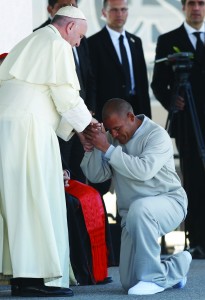
A prisoner kneels before Pope Francis during the pope’s visit to Cereso prison in Ciudad Juarez, Mexico, Feb. 17
Pope Francis: China. (laughs) To go there. I would love that. I would like to say something just about the Mexican people. It is a population that has a wealth, such great wealth, a people that surprises. They have a culture, a culture that goes back millennia. Do you know that today, in Mexico, they speak 65 languages, counting the indigenous languages, 65? It is a people of great faith. They have also suffered religious persecution. There are martyrs, now I will canonize two. It is a population that you can’t explain, you can’t explain it because the word “people” is not a logical category, it’s a mythical category. The Mexican people, you cannot explain this wealth, this history, this joy, the capacity to celebrate amid these tragedies that you have asked about. I can say another thing, that this unity, that this people has managed not to fail, not to end with so many wars, things, things that are happening now. There in the city of Juarez there was a pact of 12 hours of peace for my visit. After that they will continue to fight among themselves, no? Traffickers. But a people that still is together with all that, you can only explain with Guadalupe. And I invite you to seriously study the facts of Guadalupe. The Madonna is there. I cannot find another explanation. And it would be nice if you as journalists — there are some books that explain the painting, what it is like, the significance, and that is how you can understand better this great and beautiful people.
Carolina Pigozzi, Paris Match (France): Good evening, Holy Father. Two things, I wanted to know what did you ask Guadalupe? Because you were there a long time in the chapel praying to Guadalupe. And then something else, do you dream in Italian or Spanish?
Pope Francis: I’d say I dream in Esperanto (laughs). I don’t know how to respond to that. Truly. Sometimes I remember some dreams in another language, but dreaming in languages no, but figures yes, my psychology is this way. With words I dream very little, no? And, the first question was? (Guadalupe)
I asked for the world, for peace, so many things. The poor thing ended up with her head like this (raises arms around head). I asked forgiveness, I asked that the Church grows healthy, I asked for the Mexican people. And another thing I asked a lot for: that priests be true priests, and sisters true sisters, and bishops true bishops. As the Lord wants. This I asked a lot for, but then, the things a child tells his mother are a bit of a secret. Thanks, Carolina.
Other highlights of the Pope’s trip to Mexico
At The National Palace — Despite being the world’s second-largest Catholic country, for most of the 20th century Mexico had a tense relationship with the Vatican. Diplomatic relations were restored in 1992, but it is very rare to see a Mexican politician openly display his Catholicism. Now, not only was Francis given a state welcome in the majestic National Palace where President Enrique Pena Nieto saluted the Vatican flag, but Pena Nieto later took Holy Communion on live TV.
In his speech in the National Palace, Francis said Mexico needs honest and upright leaders concerned about the many instead of the few:
“Experience shows us that whenever we seek the path of privilege or the benefit of a few to the detriment of the common good, sooner or later life in society becomes a fertile ground for corruption, drug trafficking, exclusion of different cultures, violence and even human trafficking, kidnapping and death, causing suffering.”
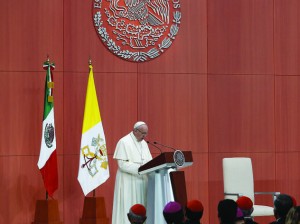
Pope Francis addresses representatives of civil society and the diplomatic corps during a meeting attended by Mexican President Enrique Pena Nieto, right, at the National Palace in Mexico City Feb. 13
At The Cathedral — After leaving the National Palace, the Pope walked into the Metropolitan Cathedral, where he admonished Mexico’s clergy to “embrace the fringes of human existence in the ravaged areas of our cities.”
“Do not allow yourselves to be corrupted by trivial materialism or by the seductive illusion of underhanded agreements,” he said. “Do not place your faith in the chariots and horses of today’s Pharaohs, for our strength is in the pillar of fire which divides the sea in two, without much fanfare.”
With Indigenous Leaders — A visually spectacular event, the Pope celebrated Mass with tens of thousands of indigenous people dressed in stunning traditional clothes. He authorized the use of indigenous languages in official celebrations and he apologized for centuries of abuse and discrimination suffered at the hands of the Church. “Some have considered your values, culture and traditions to be inferior,” he said. “Others, intoxicated by power, money and market trends, have stolen your lands or contaminated them. Forgive me. Today’s world, ravaged as it is by a throwaway culture, needs you!”
At The Border — Francis celebrated Mass not far from the fence that divides Juarez, Mexico, and El Paso, Texas, and made an impassioned plea for migrants around the world. He said this tragic global phenomenon should be measured, not by numbers and statistics, but by names and stories and families, and that those running from danger should not be criminalized.
“They are ‘cannon fodder,’ persecuted and threatened when they try to flee the spiral of violence and the hell of drugs. Then there are the many women unjustly robbed of their lives.
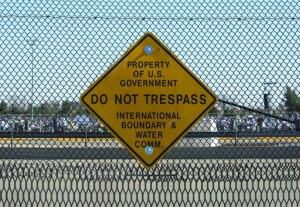
The crowd attending Mass with Pope Francis in Ciudad Juarez, Mexico, can be seen from a U.S. border fence in El Paso, Texas, Feb. 17
“Let us together ask our God for the gift of conversion, the gift of tears, let us ask him to give us open hearts like the Ninevites, open to his call heard in the suffering faces of countless men and women. No more death! No more exploitation! There is still time to change, there is still a way out and a chance, time to implore the mercy of God.”
The Basilica of Our Lady of Guadalupe — Pope Francis’ historic first pilgrimage to the Basilica Shrine of Our Lady of Guadalupe in Mexico City brought reflections of obedience, surrender, and hope.
“We have just heard how Mary went to meet her cousin Elizabeth. She sets out without delay, without doubts, without lessening her pace, to be with her relative,” Pope Francis stated during his homily.
Mary “is the woman who says ‘yes’…this is the ‘yes’ which prompted her to give the best of herself, going forth to meet others,” the Holy Father said.

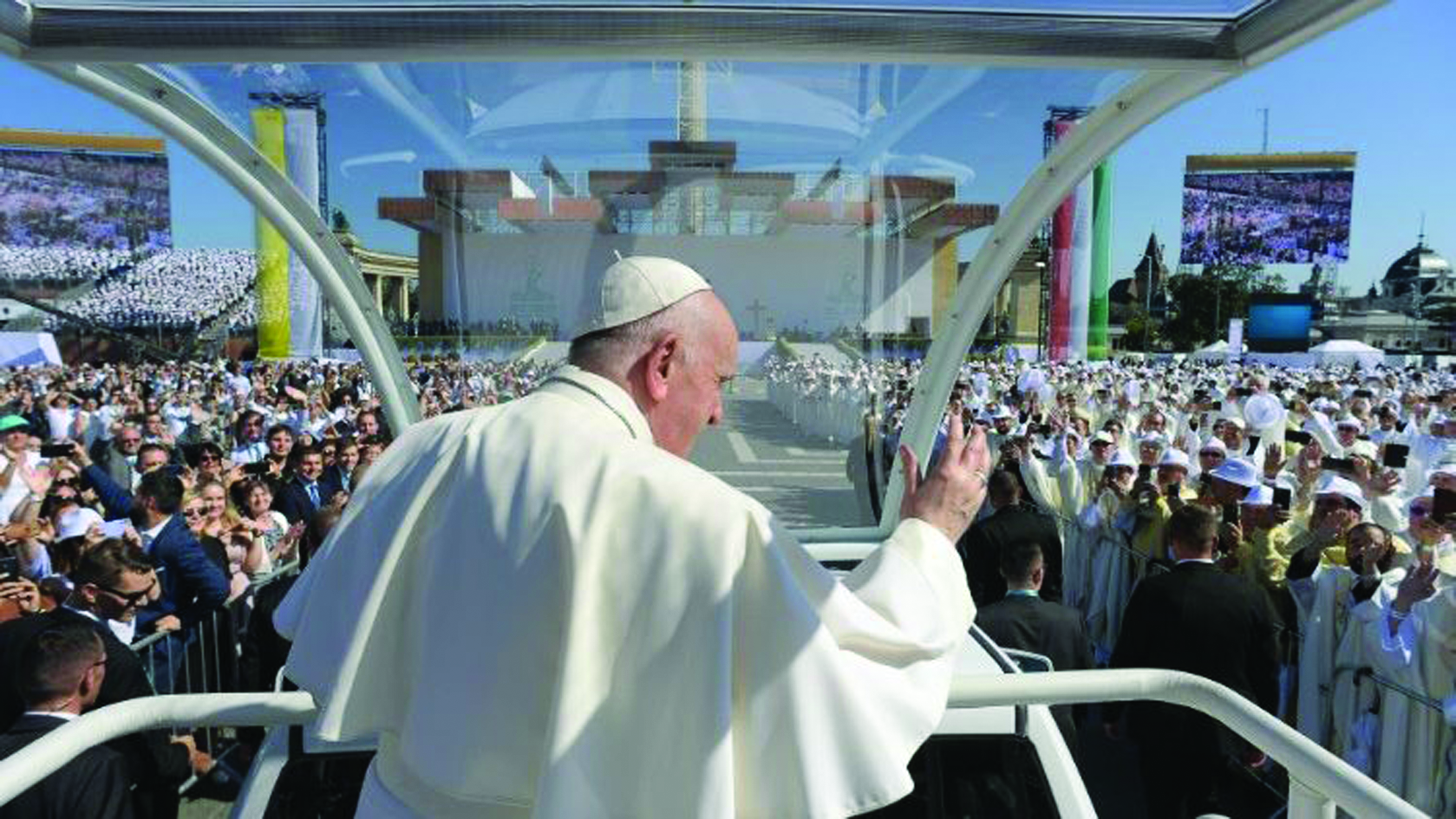




Facebook Comments